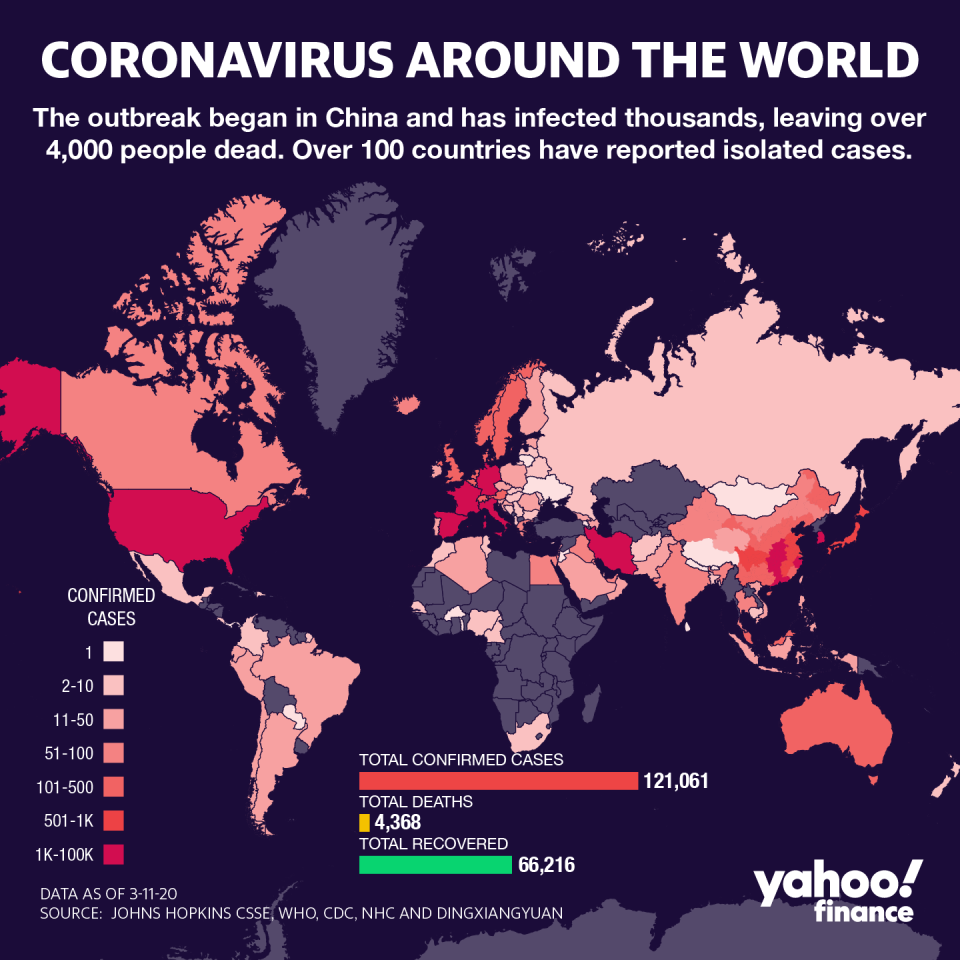World Health Organization formally declares coronavirus a pandemic
The World Health Organization on Wednesday formally declared the coronavirus a worldwide pandemic, underscoring the pathogen’s inexorable spread across the globe as new cases and deaths rise, in a sobering admission that regional efforts to contain the outbreak have been lost.
Initially, the WHO resisted characterizing the disease as a pandemic. Yet as COVID-19’s casualty count has mounted, the organization relented. Worldwide infections have surged well above 100,000 and the death toll has spiked above 4,000.
"We have therefore made the assessment that #COVID19 can be characterized as a pandemic,” said Tedros Adhanom Ghebreyesus, the World Health Organization’s director general. He added that 90% of the total cases globally are from four countries. That includes China, South Korea and Italy— which just this week was forced to quarantine the entire nation.
“In the days and weeks ahead, we expect to see the number of Covid-19 cases, the number of deaths, and the number of affected countries climb even higher,” the organization said.

The WHO’s declaration comes as efforts to contain and mitigate the coronavirus’ spread enter a new and more perilous phase. Anthony Fauci, director of the National Institute of Allergy and Infectious Diseases, told Congress on Wednesday that the worst was yet to come for the U.S.
In hotspots like New York — which currently is the largest epicenter of new infections — businesses have been allowing employees to work from home as new cases spike.
And around the nation, places like Harvard, Stanford and other universities have moved to online classes — effectively shuttering their campuses to students as more cities implement “social distancing” policies that keep most citizens from assembling in large groups. A range of major events, such as Coachella and South by Southwest, have either been postponed or canceled.
In the U.S., President Donald Trump has mobilized a task force to tackle the crisis, and last week signed a stimulus bill worth over $8 billion as the disease emerges as a serious challenge to his presidency.
The administration is also planning several supplemental stimulus measures to put more money in the hands of consumers, and backstop businesses hammered by travel restrictions, quarantines and border closures.
WHO’s Michael Ryan and Maria Van Kerkhove said basic public health techniques would be most effective, as seen in Singapore, South Korea and China.
Ryan said social distancing measures, like “locking down whole areas, canceling all sporting events, canceling religions events and closing schools” were more costly to a country than contact tracing — which focuses on the immediate circle of contact for an infected individual.
"We have never before seen a pandemic sparked by a #coronavirus.
And we have never before seen a pandemic that can be controlled at the same time.
WHO has been in full response mode since we were notified of the first cases"-@DrTedros #COVID19— World Health Organization (WHO) (@WHO) March 11, 2020
Ghebreyesus said there are still many countries without cases, and the declaration does not change how countries should respond to the outbreak. However, the rising number of infections pose a grave threat to governments and health care systems everywhere — as has been the case in Italy, where emergency rooms have reportedly been swamped with sick patients.
“All countries can still change the course of this pandemi,” he said. “If countries detect, test, treat, isolate, trace and mobilize their people in the response. We are deeply concerned by the alarming levels of spread and severity and by the alarming levels of inaction.”
Worldwide, the number of recoveries equals half of the current total infected, at more than 66,000, highlighting what the WHO says is the narrow window to rein in the disease.
The WHO began tracking the virus on January 21, which became a series of epidemics in various countries as China’s infections accelerated at a rapid pace. The disease is threatening to overtake Europe and the United States, even as infections in Asia fall from their worst peaks.
With the economic and business toll mounting, global markets have been engulfed in waves of panic selling, with major benchmarks sinking to new session lows in volatile trading following the declaration.
The outbreak was first reported in Wuhan, in Hubei province in China at the end of December. Within weeks, Chinese experts released the genetic sequence of the virus, allowing scientists around the world a chance to understand the virus, and drug companies a chance to develop treatments and vaccines.
In the world’s largest economy, the outbreak has surged past 1,000 cases within a week, largely due to testing capabilities that are more widely available. But health officials expect even more cases to appear as testing ramps up.
Anjalee Khemlani is a reporter at Yahoo Finance. Follow her on Twitter: @AnjKhem
Javier David is an editor for Yahoo Finance. Follow him on Twitter: @TeflonGeek
Read the latest financial and business news from Yahoo Finance
Follow Yahoo Finance on Twitter, Facebook, Instagram, Flipboard, SmartNews, LinkedIn, YouTube, and reddit.


